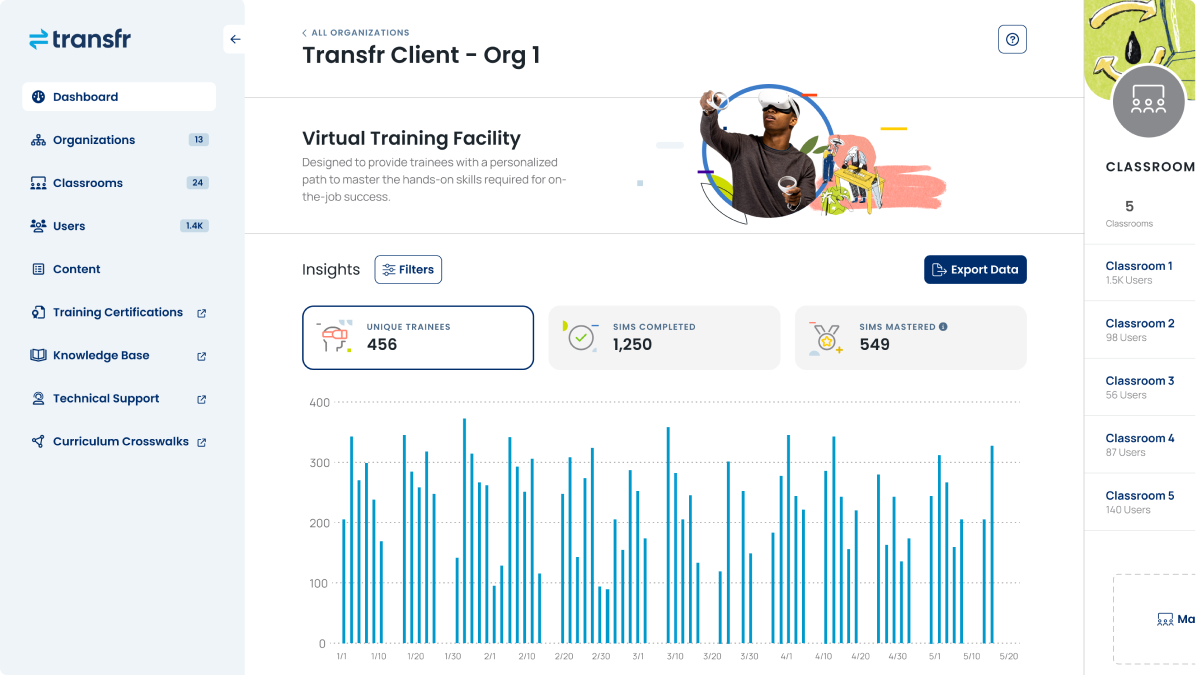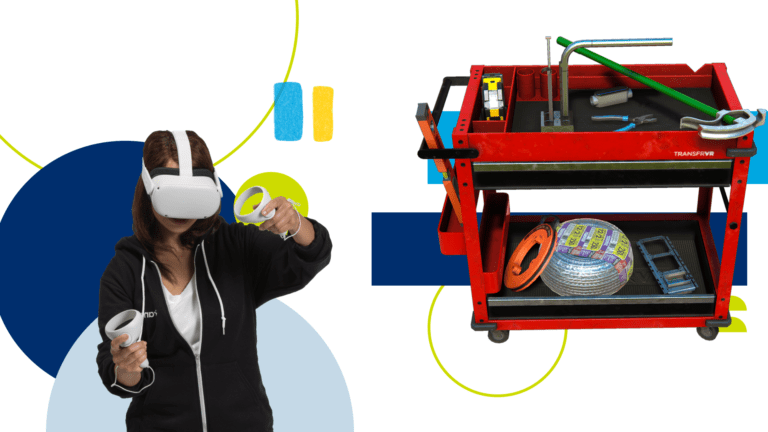As a virtual reality (VR) company, we here at Transfr get asked questions like this all the time:
“Is VR an effective training methodology?”
“Can people really learn hands-on skills in VR?”
“Does what people learn in VR stick with them when they take off the headset?”
These questions have been asked since VR’s inception. The short answer is “Yes!” (For a deeper understanding of why we can say that so confidently, please explore the numerous reports on our VR Efficacy Studies page, compiled from rigorous, original research that we conduct ourselves.)
However, anyone can post fancy-sounding reports about the supposed effectiveness of their technology. In order for those reports to carry real weight, they must be conducted with academic rigor and an eye towards the highest ethical standards. In this article, we’ll address why ethical standards are so important when conducting research, the lengths Transfr goes to in order to protect the study participants’ and their data as it’s gathered during the studies, as well as how we analyze and process the data we collect.
High ethical standards: The foundation of good data
Transfr is a complex company — we build industry-leading training simulations, we connect organizations of all kinds to provide complex webs of services for students and job seekers, and much more — so why are we also taking the time and expense to conduct in-depth research studies? And what makes it so important to uphold the highest ethical standards when conducting this research?
To dig into those questions, let’s take a step back and talk about professional standards in the realm of research: All trained researchers certified by the Collaborative Institutional Training Initiative (CITI) program in academia are trained in the ethical principles and guidelines summarized in The Belmont Report. These guidelines are designed to protect human participants in biomedical and behavioral research. While the Transfr team may be researchers in the tech industry (instead of an academic setting) we are nonetheless called upon to protect human participants in our research — which we take very seriously.
Protecting the privacy of our human participants and the security of their data is our ethical responsibility. It’s also a key way that we truly respect our clients (where we recruit many volunteers and conduct surveys) and our other volunteers. Users from a wide variety of different backgrounds need to be able to trust Transfr products from day one, starting with creating their accounts. Knowing how their data is being created, tracked, used, and protected is key to building this trust.
Product evaluation — the next step in product development
In one of my most formative student experiences, I had to debate the degree of responsibility a scientist should have for their inventions. Since the scientist who created the invention should understand the new creation’s capabilities more thoroughly than anyone else, I naively argued that the scientist should be held accountable for how their invention would be used.
Now that I’m a social scientist, I see how complicated this topic can be: The products that companies like Transfr develop can be used in a wide variety of ways, so it’s not enough for us to decide that we understand how people will use them — we must constantly monitor, study, and evaluate how trainees use them and the outcomes they’re experiencing. It’s the natural next step of product development: Product evaluation.
Product evaluation is part of our overall effort to be responsible for our inventions and ethical stewards of this ascendant technology. As we conduct our numerous studies, we’re constantly evaluating our simulations (applying the highest ethical standards in data handling, privacy, etc.) so that we can confidently state that we understand how our products work and that we’re delivering the highest-quality training to users.
Constant product evaluation is also a key way we improve our sims. Every researcher at Transfr takes seriously our responsibility to conduct ethical research and to inform our clients of the results.
People first: The importance of participant consent and privacy
Consent is of utmost importance in ethical research. When we invite our clients — or anyone else — to participate in our research projects, they should be able to make an informed decision by reviewing the potential benefits and risks associated with the research. The team here at Transfr conducts VR efficacy studies in the realms of education and psychology to increase our understanding of how people learn. This knowledge aids us in creating more effective tools to help people learn vital workplace skills more effectively. We follow the same guidelines that academic research organizations do, adhering to strict research standards and ethical principles to protect research participants and their privacy.
Data privacy is a chief concern in our online era and data collection is a critical part of our research processes. Therefore, we’re highly aware of our responsibility and respectful of the risks that our participants and clients take in trusting us with their data. Modern technology makes data collection very convenient, but we always bear in mind that data comes from humans. The massive sets of numbers we see on our computers didn’t come from nowhere — they were collected from real people!
These numbers represent people’s activities, actions, life events, and career journeys. In earlier days of scientific research, scientists needed to collect data from individual participants by meeting with them, observing them, and measuring their activities and outcomes. This data collection process has become so streamlined that it can be easy to forget about how that data is generated. Remembering the human component is an important guiding ethos for our research team.
Safeguarding data, changing lives
After data collection, our team processes and analyzes it following rigorous research standards in order to avoid producing biased results. Researchers’ ethical standards matter, because without these standards, the results we present would be meaningless!
At Transfr, our mission is to help trainees transform their lives with the tools and resources we provide. But this can only happen when we provide the tools and resources that work for our them. Constantly evaluating our products and scientifically demonstrating how they work is part of our ongoing effort to deliver only the best for our clients and the people we serve. Upholding the highest ethical standards in our research is ultimately part of how we help people from pools of undiscovered talent get on pathways towards important careers with upward mobility.





